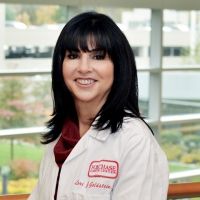Forbes Physician Honor Role Recognizes Lori Goldstein
Lori Goldstein, MD, FASCO, is among 27 breast oncologists across the country to be recognized by <em>Forbes’ </em>“Physician Honor Role”<em> </em>as an extraordinary physician in the field of oncology.
Lori Goldstein, MD, FASCO

Lori Goldstein, MD, FASCO
Lori Goldstein, MD, FASCO, is among 27 breast oncologists across the country to be recognized byForbes’“Physician Honor Role”as an extraordinary physician in the field of oncology.
Goldstein is currently the deputy associate director of clinical research, professor of medical oncology and director of the Naomi and Phil Lippincott Breast Evaluation Center (BEC) at Fox Chase Cancer Center in Philadelphia, Pennsylvania. She is also a current member of the Breast Cancer Guidelines Committee for the National Comprehensive Cancer Network.
Goldstein founded BEC after joining Fox Chase Cancer Center in 1990 to provide useful information along with the best treatment options available for women with early stage breast cancer. Through this program, she seeks to empower her patients with the ability to make their own decisions about their care. In addition to her clinical work, she was the first leader of the Breast Cancer Research Program, now the Women’s Cancer Research Program, and is the principle investigator for the Eastern Cooperative Oncology Group at Fox Chase.
She is also a dedicated member of the American Association for the Advancement of Science, American Association for Cancer Research, American Society of Clinical Oncology, the National Accreditation Program for Breast Cancer Centers, and the Women in Cancer Research.
Her research focuses on translational studies, development of novel therapeutic strategies and molecular targeting of breast cancer. She tailors her research towards a national agenda for breast cancer research and care.
In addition to her recognition withForbes, Goldstein has also been listed amongAmerica’s Top Doctors, Philadelphia Magazine Top DocsandBest Doctors in America. In 2014, she was awarded the Susan G. Komen’s “Light of Life Award.”
Goldstein received her medical degree in 1982 at the State University of New York Upstate College of Medicine. She later completed her residency in internal medicine at the University of Pittsburg School of Medicine and completed fellowship in oncology at the National Cancer Institute.
The 27 breast cancer physicians were individually selected through a partnership with Grand Rounds in an effort to identify the best physicians in the country. A computer-based algorithm used by Grand Rounds scanned publicly available and proprietary data to better understand where physicians were trained, who they work with, what they prescribe, and the procedures they perform. The individuals selected all serve in the top spots of their respective hospitals and make significant contributions to their field. For the full list, seehttps://www.forbes.com/sites/matthewherper/2017/12/05/big-datas-top-breast-cancer-oncologists/#50f447de3891.
Therapy Type and Site of Metastases Factor into HR+, HER2+ mBC Treatment
December 20th 2024During a Case-Based Roundtable® event, Ian Krop, MD, and participants discussed considerations affecting first- and second-line treatment of metastatic HER2-positive breast cancer in the first article of a 2-part series.
Read More
Imlunestrant Improves PFS in ESR1-Mutant Advanced Breast Cancer
December 13th 2024The phase 3 EMBER-3 trial showed imlunestrant improved PFS over SOC endocrine therapy in ER-positive, HER2-negative advanced breast cancer with ESR1 mutations, though not significantly in the overall population.
Read More
Breast Cancer Leans into the Decade of Antibody-Drug Conjugates, Experts Discuss
September 25th 2020In season 1, episode 3 of Targeted Talks, the importance of precision medicine in breast cancer, and how that vitally differs in community oncology compared with academic settings, is the topic of discussion.
Listen
Postoperative Radiation Improves HRQOL Over Endocrine Therapy in Breast Cancer
December 13th 2024In the phase 3 EUROPA trial, exclusive postoperative radiation therapy led to better health-related quality of life and fewer treatment-related adverse events in older patients with stage I luminal-like breast cancer at 24 months.
Read More